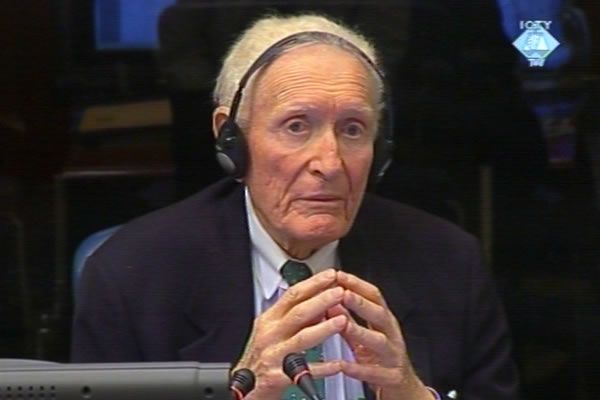Home
GAP BETWEEN WORDS AND DEEDS
Radovan Karadzic and Ambassador Herbert Okun disagreed about a set of documents: the former claimed that the documents show that Republika Srpska authorities advocated peace and respect of international conventions, while the latter argued that the same documents show that there was a ‘gap between words and deeds’. In Okun’s view, the actual situation was completely different. Okun found Karadzic’s claim that the West ‘wanted to neutralize Muslims using Serbs and Croats as its tools’ ‘not only nonsensical but ridiculous too’
 Herbert Okun, witness at the Radovan Karadzic trial
Herbert Okun, witness at the Radovan Karadzic trial In the final part of his cross-examination of Ambassador Herbert Okun, Radovan Karadzic brought up his orders to the military and civilian authorities in Republika Srpska to respect the provisions of international humanitarian law and the Geneva conventions, to prevent civilians from leaving their homes and to make an effort to bring back the refugees from other ethnic groups’. Karadzic also ordered them to give the International Red Cross free access to prison centers.
The accused went on to quote from his address in the Assembly where he said that all Muslims living in the Bosnian Serb state should have all their rights guaranteed, ‘provided that they are not hostile and provided they lay down their arms’. ‘Even as you expressed those noble sentiments, the Bosnian Muslims were ethnically cleansed,’ Okun responded. Ambassador Okun maintains that the documents Karadzic showed him contain ‘nice words’, but the actual situation was completely different. The documents in fact showed that there was a ‘gap between words and deeds’, Okun noted.
In his effort to show that he in fact advocated peace, Karadzic said he had ‘appealed to the Bosnian Muslims to cease hostilities’ in May 1992, when he called them to surrender their arms and ‘enjoy the protection of the Serb authorities’. In his appeal, Karadzic also said that the Western countries wanted to ‘neutralize’ Muslims in Bosnia by pushing them into war with enemies that were too strong for them, Serbs and Croats. ‘This is so not true that it is ridiculous’, Okun replied, adding that during the war the West sympathized with the Bosnian Muslims. Moreover, Okun was amazed to see that Karadzic after three days of trying to show that the West was unfair toward the Serbs, ‘now suddenly’ wanted to show that the Western powers actually wanted to eliminate the Muslims.
Karadzic said that he trusted the ambassador’s notes taken from October 1991 to May 1993, but didn’t trust his evidence before the court. Karadzic and his associates put together an analysis he entitled Okun vs. Okun in which he tried to show that Okun’s testimony contradicted his notes, tendered into evidence by the prosecution. Karadzic gave an example of ‘a drastic difference’ between the notes and the evidence. According to Karadzic, Okun never wrote down that Karadzic demanded that the Serb municipalities should develop ties with Yugoslavia, otherwise ‘there will be war’, as he threatened.
In a brief re-examination, the prosecutor noted that Okun wrote down Karadzic’s threat in his notebook in the entry for 2 December 1991.
The trial of Radovan Karadzic for genocide and other crimes in BH from 1992 to the end of 1995 continues on Wednesday with the evidence of Fatima Zaimovic and David Harland.
Linked Reports
- Case : Karadzic
- 2010-04-27 OKUN: THERE WERE NO ANGELS IN BH
- 2010-04-26 WHO CAUSED MUSLIMS TO SUFFER?
- 2010-04-23 AMBASSADOR OKUN: KARADZIC WAS ‘DISHEVELED AND MELODRAMATIC’
- 2010-05-05 CHILDREN SUFFERED WAR TRAUMA IN SARAJEVO
- 2010-05-06 KARADZIC: ISLAMIC DECLARATION IS TO BLAME
- 2010-05-06 ‘TURNING SARAJEVO’S TERROR TAPS’
